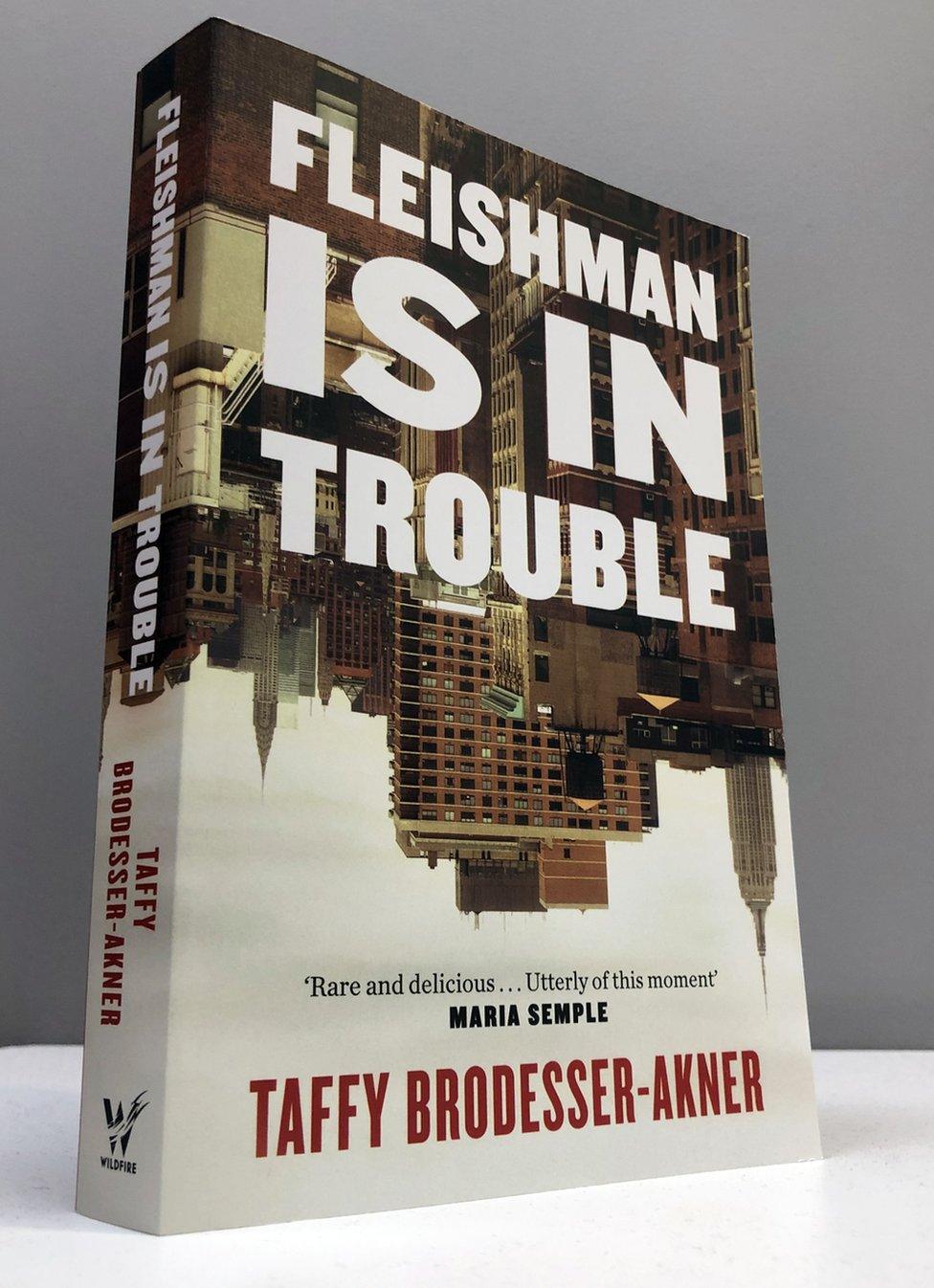Fleishman Is In Trouble: Will Gompertz reviews Taffy Brodesser-Akner's debut novel ★★☆☆☆
- Published

My mother grew up during World War Two in circumstances that were not ideal. In the 1950s she trained to be a nurse and subsequently took a job in a bomb-damaged East End hospital in London. Both experiences were formative, helping to make her the wise old lady she is today.
She has always been very generous with her unsolicited advice. At times it would be specific, such as, "why don't you take your socks off and let the air get to your feet, dear."
On other occasions it would be more general; a bon mot like: "You can have too much of a good thing."
The saying probably made sense to her. She is from the "making do" generation.
I am not.
When I was a teenager having too much of a good thing was the single biggest reason for getting out of bed. But now I am older, and fractionally wiser, I am beginning to come around to her way of thinking. Specifically, when it comes to sex.
Everybody seems obsessed with it. Presidents, prime ministers, TV producers, and the press.
But what about our intellectual side? The bit that differentiates us from other animals: our imagination, our creativity. That can be stimulating too, can't it? Exciting even. Like sitting down with this summer's hit novel, Fleishman Is In Trouble.



It's got a great cover, with the hipster title printed in white type over an image of an upside-down New York City, an inversion reflecting the up-ended lives of its two main protagonists - Toby and Rachel Fleishman, and also, to a lesser extent, Libby the narrator.
It is a hot book for a hot summer about a hot city by a hot new novelist, Taffy Brodesser-Akner, who counts Nigella Lawson and Dolly Alderton among her fans.


The author, Taffy Brodesser-Akner says writing magazine profiles taught her "what people say when they want you to know a version of themselves that isn't the truth"


Nigella Lawson describes Fleishman Is In Trouble as a "great novel with depth, wit, nuance and life"

Admittedly, it is about love, lust and a marriage breakdown and is therefore bound to have sex hardwired into its DNA - wanting it, getting it, wanting it but not getting it, getting it but not wanting it, not getting it and not wanting it and so on.
But that needn't dominate the narrative; great reads are about characters and plot not slap-and-tickle.
Rachel Fleishman was orphaned as a child and neglected by her grandmother but is now a dynamic, intelligent, highly successful founder and owner of a leading creative agency. Toby Fleishman, her husband, is a 5ft 5in (1.65m), 41-year-old doctor with a barely concealed eating disorder and a promotion in the offing. They have two children: a stroppy 11-year-old daughter called Hannah, and her sweet and vulnerable younger brother Solly.
Rachel and Toby once truly loved each other, now they truly loathe each other.
They are living separate lives, in separate apartments a few blocks apart in New York. Hannah and Solly and the divorce settlement are the only reasons they continue to communicate.
Without warning, Rachel leaves the kids with Toby at 04:00 one morning and disappears.
That makes him cross.
The trials and tribulations of matrimony are a familiar subject for a novel: Madame Bovary, Tender is the Night, Revolutionary Road, My Brilliant Friend, and Anna Karenina immediately spring to mind.

Flaubert's Madame Bovary and Ferrante's My Brilliant Friend are among the novels that have also explored the ups-and-downs of marriage
But Taffy Brodesser-Akner brings something fresh to the subject: a sharp insight into the gender disparities and unspoken value judgements that are the framework within which modern urban elites operate.
Stereotypes are challenged with a man taking the role of under-appreciated carer and the woman the cold-hearted careerist.
Rachel is criticised for wanting all the trappings of wealth: the beach house, the all-mod cons apartment; the convertible car. She certainly couldn't have too much of a good thing. But she can have too much of Toby. And who can blame her.
The man is a self-satisfied narcissist.
He is a bore, a big head, and a braggart. He is her immediate problem, and also the most obvious fault with the novel. Its dramatic structure relies on caring about what happens to him and being sympathetic to his situation.
I wasn't.
Rachel is the more interesting protagonist, but she gets a lot less of the edit. Likewise Libby, from whom we hear a lot but know very little (she was a magazine features writer before quitting and moving with her loyal husband to New Jersey).
And then there are the plot holes, which are deep enough to twist an ankle.
Surely Toby would have taken his wife's prolonged disappearance more seriously? And Libby wouldn't have waited an eternity to call him out for being a self-interested whinger, nor let it slide when she eventually did.
The net result is a novel which is lively and modern in tone (there are apps and smartphones) with an enjoyable satirical touch, but I found it laborious to read and ultimately not very interesting.
Many of its 373-pages seemed like padding, much of which consists of… sex.
Or sexting.
Or thinking about sex.
Or thinking about sexting. Page after page after page after page after page after page (to use a Brodesser-Akner stylistic trope) of cartoon cut-out, middle-aged characters with one-track minds.
Maybe that's how folk are in uptown New York nowadays. Fine, but I don't want to hang out with them.
I know a lot of people love this novel.
Bookshops have sold out, the publishers are reprinting - it has that magic buzz about it.
Maybe I'm missing something.
I'll give it to my wife and see what she thinks. She's right about most things.
Recent reviews by Will Gompertz
Follow Will Gompertz on Twitter, external
